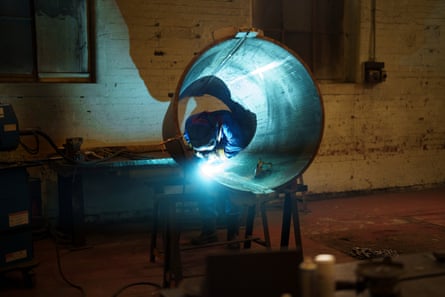Unassuming wooden crates filled with brake pads and metal springs are piled high in the loading bay of the Broadbent factory close to Huddersfield city centre. Shipping them out to Nigeria and Ghana remains the day job for Simon Broadbent, but the manufacturer’s owner has a growing issue nagging at him – the fate of his 160-year-old business in the face of Labour’s tax overhaul.
Broadbent has emerged as a reluctant challenger to plans by the chancellor, Rachel Reeves, to strip family firms of the ability to pass on their businesses tax free from next April. Campaigners, including the manufacturers association Make UK, say the tax overhaul threatens the backbone of the British industrial sector.
Under the current system, business property relief allows families to pass on assets free of inheritance tax (IHT). Reeves’s IHT changes – which have also caused shock and anger among farmers – would mean children who inherit companies’ property assets, which in many cases is a factory, will need to find the money to pay IHT at 20% on assets above £1m.
Once assembled on the west African coast, Broadbent’s crafted metal parts will be attached to his centrifugal spinning machines, designed for sugar refiners to separate sugar crystals from molasses.
Simon, 72, is the great-great grandson of the company’s founder, Thomas Broadbent, and as its current chair he controls one of the few metal forming operations in the UK, bending and welding rolled steel into sophisticated machines that are exported all over the world.
He fervently makes the case for small, family-owned businesses. “For every JCB and Dyson, there are hundreds of firms just making a decent living, but not a fortune, and certainly not enough that we can hand over 20% of our perceived wealth every time one of us dies,” he says.
“We want the company to have a future, and there is no reason why it shouldn’t when we have a good product to sell. Yet we are in a situation now where, if I die on the wrong day, our plans to keep it going could all be derailed.”

Broadbent, whose company also has operations in China and Thailand, is concerned that Reeves’s plan will allow only a proportion of family assets above £1m to be passed on to the next generation tax free.
Certain Treasury allowances mean that, in some circumstances, the tax free limit increases to £3m, as it does for farming estates. But like farmers, business owners argue that the asset value of the firm is irrelevant as there is no intention to sell.
HMRC confirmed last month that the changes would go ahead as planned, after outlining how asset values would be calculated.
Reeves, who is expected to raise taxes in her 26 November budget as she faces a large spending deficit, has defended the reduction in tax relief, arguing that the Treasury is unable to afford to continue the subsidy and that only a handful of estates each year will be affected.
When the plan was announced last year, the Treasury’s independent forecaster, the Office for Budget Responsibility (OBR), tentatively estimated that the projected revenue from the changes to business property relief and the agricultural property relief affecting farmers in a similar way would be £500m a year from 2027/28.
Broadbent says factories are not like stocks and shares, “you can’t sell off part of the factory. You need all of it. Otherwise you can’t make the product”.
Given the way land values and property assets of all kinds have soared over the last 40 years, many family owners have found themselves asset rich and cash poor, putting a strain on finances. The high value of the pound, soaring energy bills, Brexit and competition from China have been enough to send many British manufacturers bust.
Now some of those that remain have run the numbers and say an extra tax bill will mean they need to starve their companies of investment, or sell up.
Family Business UK, a lobby group for family-owned firms, believes Reeves’s plans are likely to trigger a fire sale of British-owned businesses or a depressed sector, with owners forced to redirect working capital – the investment funds needed for research and development – into paying the IHT bill.

A study by CBI Economics found that family businesses make up more than 90% of private sector companies in the UK and provide employment for nearly 16 million people.
CBI said figures to the end of 2023 show family businesses generated £985bn, equivalent to 59% of total private sector income. More than half of respondents to its survey said they were cancelling or delaying investments while they consulted advisers about the financial implications of the IHT changes.
Josh Burbidge heads the family firm Archwood Group and the Richard Burbidge manufacturing brand, which can trace its roots to the same decade that Thomas Broadbent was inventing spinning machines to dry wool for the Yorkshire textile industry – the 1860s.
He manages the factory near Chirk in north Wales. Originally based in Coventry, the company was lured, along Cadbury’s, to set up factories in a neglected part of Wales by government subsidies that have long since run out.
These days 40% of revenues stem from making wooden stairs for new-build properties. Burbidge says the company is embedded in the local community and has overseen investments that have not only transformed the factory into an eco-haven covered in 2,600 solar panels, but has also negotiated with wood suppliers in China, Estonia and Sweden to do the same.
“The fact we are a family business means we keep the business going for the next generation. We have made it an environmental and sustainable business.
after newsletter promotion
“I get that the government needs tax revenues to improve public services, but I am concerned that changes to business assets relief is a backward step.
“The alternative is that firms like this are owned by private equity … focused on the money and not the people or the local community.
“Britain should follow the German model that recognises family businesses,” he says.

Germany’s Mittelstand business community is famous as the bedrock of the country’s manufacturing miracle. Family firms that have survived two world wars continue, winning praise from politicians for generating exports.
The upmarket appliance maker Miele and the power tool firm Stihl are among the top 500 family firms that generate 43% of Germany’s economic output. Giving some heft to the list are Volkswagen, Lidl and Aldi, which are also family owned.
German companies lobbied for the tax-free transfer of property assets in the early 1990s at the same time as their British counterparts. Both won after their respective governments conceded that family firms had no intention of capitalising on rising property values and simply wanted to continue running the same business.
Only when cash was extracted was there tax to pay. It meant that while company funds remained inside the business, successive generations could carry on in charge.
Peer-Robin Paulus, the head of policy at the Family Business Association in Potsdam, says: “The key for any business is to retain enough capital to invest in IT and digital technologies to remain market leading companies. Otherwise you go bust.
“We have to accept that some people will abuse the privilege, but that is a very small risk and worth it to save a vast swathe of family businesses.”
Jonathan Roberts, the head of external affairs at the Country Land and Business Association, says the IHT changes will prove to be loss-making for the Treasury because families will freeze major investments.
“We have put forward a plan that allows the Treasury to claw back tax if families sell within seven years of inheriting. That would show ministers that families are committed to their businesses and not seeking to exploit them,” he says.
A spokesperson for the Treasury said most estates claiming tax relief will fall below the IHT threshold. The largest companies, 4% of the total, claim the biggest amount of tax relief at 53% and should pay a higher inheritance bill, it argues.
“The money raised will go towards public services we all rely on every day instead,” they said.
Broadbent’s children are not part of the business, but like many family owners, he wants the ethos and practice of hi-tech manufacturing to continue in his home town. He is on the hunt for a like-minded family steeped in the industry to buy his business.
He says Reeves’s “tax raid” has all but scuppered that project. “Maybe it was naive to think there is such a family out there, but the uncertainty created by the tax changes means my aim will be much more difficult to achieve,” he says.

 3 months ago
64
3 months ago
64

















































